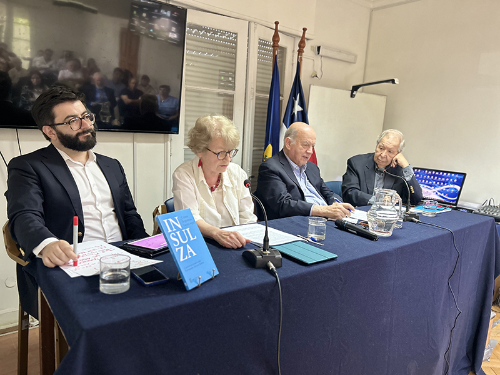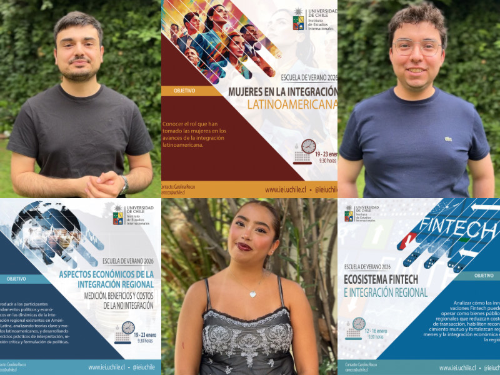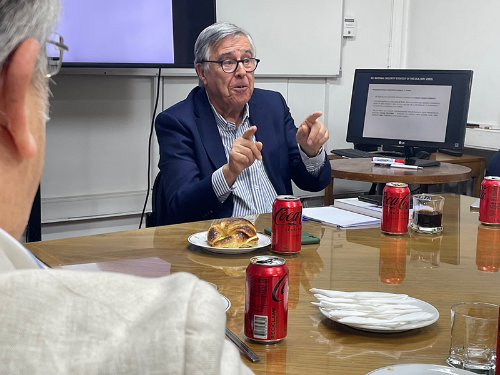Durante su intervención, el Sr. Lamy dijo que la adjudicación de una Cátedra es un reconocimiento a la competencia de las instituciones seleccionadas y a la dedicación de su personal docente, y les deseó el mayor éxito para que su asociación con la OMC sea verdaderamente fructífera.
En dicha reunión, la Prof. Dorotea López G., profesora del Instituto de Estudios Internacionales de la Universidad de Chile, y titular de la Cátedra OMC - Chile, expuso los principales objetivos de la Cátedra OMC de nuestro Instituto en materia de docencia, investigación y extensión.
La reunión contó con la participación de los titulares de las 14 Cátedras OMC, expertos de la Secretaría de la OMC, representantes del cuerpo diplomático en Ginebra y expertos de otros organismos de Naciones Unidas.
|
Discurso Pascal Lamy Good morning. I would like to extend a warm welcome to all of you on the occasion of this formal launch of the WTO Chairs Programme. I should particularly like to welcome those of you from out of town, both the Chairholders from 14 universities around the world, and those members of the Advisory Board who were able to find the time to come to Geneva. It is also good to see some of the Geneva trade community here in support of their national WTO Chairholders. As many of you know, the WTO Secretariat has been entrusted by the WTO membership to cooperate with governments in developing countries to enhance knowledge and understanding of the multilateral trading system and to facilitate more effective participation in its work. This is the raison d'être of our technical cooperation programme. Our efforts in this area have expanded considerably since the beginning of the Doha Round in 2001. We take this mandate very seriously and we are always on the lookout for ways of improving our game. We care about this because we believe that trade is an essential accompaniment of growth and development, and in order to benefit fully from the opportunities offered by trade, countries must be expert in identifying their trade interests, articulating them, and negotiating with trading partners for mutually beneficial outcomes. For some time now, starting with our regional trade policy courses with which some of you may be familiar, we have sought partnerships with academic communities in developing countries. Since our mandate is to support governments, one might ask why, then, do we seek to work with universities? The answer is simple. We believe that the scholarly community is a source of valuable knowledge in any country. It brings to the table insights, understanding and a legitimacy that outside specialists can only partly hope to offer. The WTO Chairs Programme, then, is an important plank of the Secretariat's strategy for academic support on capacity building, as reflected in our Technical Assistance and Training Plan. We believe in the particular contribution of national universities and research centres to the discussion and analysis of issues of public interest, including trade policy. Most governments around the world rely on those contributions and analytical capacities to formulate sound policies. I should like to congratulate the 14 institutions that have been selected in this first phase of the programme. The award of a Chair is an acknowledgment of the competence of the selected institutions and the dedication of its scholars. It is also an encouragement to your researchers and students to take an interest in multilateral trade matters, a cornerstone of international global governance. As you well know, trade issues by nature require a framework that takes a holistic view of the world economy. This is not only because of inter-linkages among the various sectors in any economy, but also because of the relationships between sectors in one economy and the economies of the rest of the world. Through your analytical contribution, you can help explain the workings, benefits and challenges of the trading system. Academics can help citizens understand and cope with the complexities of international business and globalization. They can also foster greater awareness and informed debate on international trade issues. The ultimate objective of the WTO Chairs Programme is to strengthen the human and institutional capacities of universities from developing countries to support governments in the formulation of sound trade policies. The programme also seeks, through the Chairs, to support and facilitate the involvement in the process of other relevant stakeholders, such as the private sector, non-state actors and civil society. Policies that are understood and supported by the public at large are far more likely to succeed than those that are simply imposed, whether by internal or external decision-makers. Each one of the universities selected for the programme has put forward its own work plan, specifying the intended output. I understand that you will be discussing these projects amongst yourselves over the next couple of days. The projects generally comprise a mixture of elements - increased course offerings on trade, policy-relevant research, and outreach activities aimed at raising awareness of trade-related policy issues. These are your proposals, and your projects. You own them. We are here to help, not to lead. It is in this spirit that we have designated counterparts from the Secretariat to work with the Chairholders. It is for you, the Chairholders, to indicate what you need from us. As I have said, we stand ready to help in whatever way we can, obviously bearing in mind our own resource constraints. We look forward to seeing progress. I believe that the first two years of the programme are crucial in terms of demonstrating to the WTO membership, and in particular the contributors to the Global Trust Fund, that this is a good way to use their resources. Some concrete output early on in the programme will serve to demonstrate the relevance of this approach, and that will be essential if we are to continue with, and expand, the programme. Let me, finally, thank the Secretariat staff for their hard work on this programme, which was efficiently steered by Deputy Directors-General Valentine Rugwabiza and Alejandro Jara. I wish you every success in your endeavours. Thank you for your attention.
Fuente: www.wto.org |







